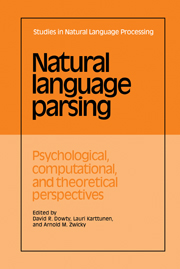Book contents
- Frontmatter
- Contents
- Contributors
- Acknowledgments
- Introduction
- 1 Measuring syntactic complexity relative to discourse context
- 2 Interpreting questions
- 3 How can grammars help parsers?
- 4 Syntactic complexity
- 5 Processing of sentences with intrasentential code switching
- 6 Tree adjoining grammars: How much context-sensitivity is required to provide reasonable structural descriptions?
- 7 Parsing in functional unification grammar
- 8 Parsing in a free word order language
- 9 A new characterization of attachment preferences
- 10 On not being led up the garden path: the use of context by the psychological syntax processor
- 11 Do listeners compute linguistic representations?
- Index
7 - Parsing in functional unification grammar
Published online by Cambridge University Press: 25 January 2010
- Frontmatter
- Contents
- Contributors
- Acknowledgments
- Introduction
- 1 Measuring syntactic complexity relative to discourse context
- 2 Interpreting questions
- 3 How can grammars help parsers?
- 4 Syntactic complexity
- 5 Processing of sentences with intrasentential code switching
- 6 Tree adjoining grammars: How much context-sensitivity is required to provide reasonable structural descriptions?
- 7 Parsing in functional unification grammar
- 8 Parsing in a free word order language
- 9 A new characterization of attachment preferences
- 10 On not being led up the garden path: the use of context by the psychological syntax processor
- 11 Do listeners compute linguistic representations?
- Index
Summary
Language is a system for encoding and transmitting ideas. A theory that seeks to explain linguistic phenomena in terms of this fact is a functional theory. One that does not misses the point. In particular, a theory that shows how the sentences of a language are all generable by rules of a particular formal system, however restricted that system may be, does not explain anything. It may be suggestive, to be sure, because it may point to the existence of an encoding device whose structure that formal system reflects. But, if it points to no such device, it simply constitutes a gratuitous and wholly unwelcome addition to the set of phenomena to be explained.
A formal system that is decorated with informal footnotes and amendments explains even less. If I ask why some phenomenon, say relativization from within the subject of a sentence, does not take place in English and am told that it is because it does not take place in any language, I go away justifiably more perplexed than I came. The theory that attempts to explain things in this way is not functional. It tells me only that the source of my perplexity is more widespread than I had thought. The putative explanation makes no reference to the only assertion that is sufficiently self-evident to provide a basis for linguistic theory, namely that language is a system for encoding and transmitting ideas.
- Type
- Chapter
- Information
- Natural Language ParsingPsychological, Computational, and Theoretical Perspectives, pp. 251 - 278Publisher: Cambridge University PressPrint publication year: 1985
- 30
- Cited by



